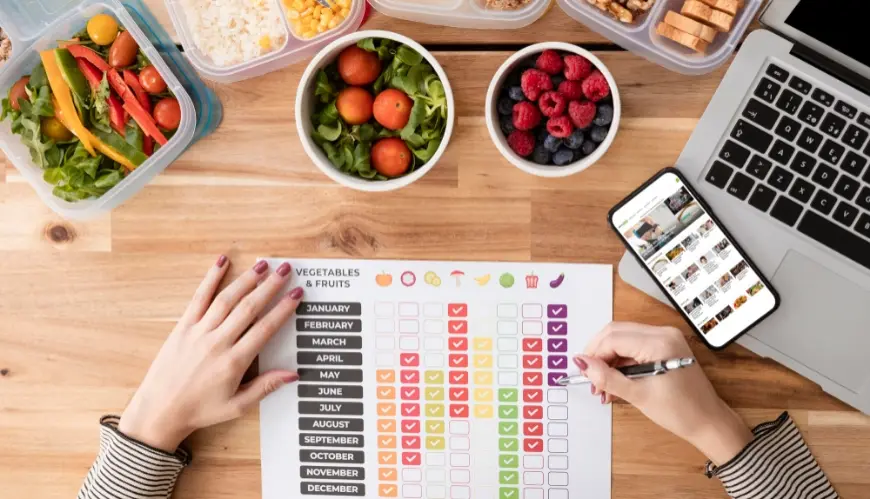Maintaining a certain daily caloric intake is beneficial for both achieving and maintaining optimal weight. Studies suggest that consuming the ideal amount of calories in accordance with a balanced diet can significantly enhance your health and assist longevity.
Understanding first, the recommended calorie requirements are crucial when figuring out how many calories you should consume each day. Considering additional factors will help you tailor your calorie needs to complement your body composition and health goals effectively. Below are essential points about everyday caloric consumption.
What's the Recommended Daily Caloric Intake?
The daily caloric intake one should consume can fluctuate depending on factors such as changes in physical activity, overall health status, and alterations to our body mass and dimensions. It is insightful to be aware of suggested guidelines for calorie consumption since these would give a more clear understanding of the range that you fall into. These indicators often adapt according to different age groups: adults, adolescents or children.
Adults
According to the Dietary Guidelines for Americans 2020-2025, adult women are advised to consume between 1,600 and 2,400 calories per day. The calorie requirement for men is a little more, ranging from 2,200 up to 3,200 calories daily.
In case you're quite inactive or of advanced age, you'll likely require fewer calories - probably close to the lower end of the mentioned range. However, if you're rather physically active or if you are pregnant or nursing an infant — your caloric demand may be closer towards the higher end of these ranges.
Adolescents
The suggested calorie consumption for adolescents can fluctuate depending on their age, gender and physical activity. For a 13-year-old female teen, it is generally advised that they consume around 1,600 to 2,200 calories every day whilst the daily caloric intake suggestion for a male of the same age is normally set between 2,000 and 2,600.
As they get older into their mid to late teens this guidance marginally increases. Females aged between 14 and 18 should ideally aim for a daily intake of about from 1,800 to up until roughly around 2,400 calories. For males in this identical age bracket somewhere at the range of approximately 2k -3.2k calories per day are usually recommended.
Kids
Youngsters who are between two and three years need a daily intake of calories varying from 1,000 to 1,400. Their exact requirement within this bracket relies on their activity level.
For those aged four to eight years, the calorie count starts at 1,200 daily. The limit escalates to 1,800 calories for females and up to 2,000 calories for male children. Between the ages of nine and thirteen years old, girls should consume anywhere from 1,400 to 2,200 calories each day while boys require around 1,600 to a maximum of 2,600 daily.
Babies as well as younger kids commonly exhibit effective self-regulation when it comes down to caloric intake management. Therefore it might prove more beneficial focusing on providing them with nutritionally diverse food rather than constant vigilance over their total calorie consumption.
Elements Influencing the Quantity of Calories You Should Consume
The daily calorie requirement varies for different individuals as there isn't a one-size-fits-all. This variability is influenced by factors such as:
- Gender
- Tallness
- Body mass
- Years of Life
- Regular physical activities
Furthermore, factors impacting the energy usage by your body aka how many calories you need, span beyond these to include hormones at play in your body and medications like steroids or diabetes drugs that may be in use. Your overall health state also plays a role.
Food labels offering Nutrition Facts are usually calibrated on an assumption of 2,000-calorie diets per day. However, it must be borne in mind that this does not apply uniformly across all individuals given their distinct metabolic needs which determine their healthy weight.
Utilizing Weight Loss Calculators
If your objective is to either drop weight, pile on extra pounds or just keep your present weight stable, an internet-based calculator (or apps that count calories) might be useful. The information needed by the calculator includes gender, current weight, height and age to work out the required amount of calories for fueling your body's day-to-day activities.
Following this, it calculates either how many additional calories you need if you're looking to gain some mass or minus points those unrequired ones when trying to lose excess fat. It can also tally the calorie intake necessary for ensuring the maintenance of present fitness figures.
Providing correct data aids in assessing daily energy needs. And should there be doubts about physical activity levels daily, maintaining a record of a week-long routine activities or inspecting numbers off any wearable tech gear can offer instant valuation.
The subsequent step would have the calculator questioning about end targets. Truthfulness at this juncture is imperative; goals must always appear feasible and not lofty dreams that seem hardly achievable but once attained they could certainly pave way for new ambitions.
Lastly, if reducing sizes is what one wishes for then an ideal reduction rate would lie between 0.5 to 2 lbs weekly; however in instances where gaining bulk becomes essential then accumulation anywhere around 1-2 lbs per week seems optimum and healthy.
Achieving Your Target Weight
Subsequently you provide your particulars in the caloric counter, a specific daily caloric consumption objective will be allotted to you. This is essentially the daily energy intake quantity you ought to maintain so as to attain your sought-after weight within the proposed duration.
To Lose Weight
If your ambition is to shed pounds, a caloric deficit is incorporated into your advised daily calorie consumption. A calorie deficit basically refers to an energy shortage - intake of fewer calories than you burn - thus causing your body to utilize the stored fat (excess weight) as fuel.
You can achieve a calorie deficit by consuming lesser than what your body demands and also by burning supplementary calories through augmented physical exercises. More effectively, combining both - a well-balanced diet along with workouts - constitutes a healthy approach towards losing weight.
Although it might seem appealing to drastically trim down on our caloric ingestion, extraordinarily low-calorie diets (below 800-1000 calories per day) can have adverse effects. Only proceed with such extreme measures under the guidance of a healthcare practitioner so that they can ensure its adherence to your nutritional requirements.
Putting on Weight
If your aim is to put on weight, it's essential that your daily calorie intake exceeds what you expend. Follow these simplistic instructions aimed at assisting healthy gain:
- Consume food of high-quality and rich in calories, like nutrient-dense meats, wholesome fats, and whole grain products.
- Increase the frequency of meals (beneficial if you rapidly feel full).
- Boost the caloric content of your diet by adding nuts to breakfast options such as oatmeal.
- Sip on shakes packed with nutrients.
- Incorporate resistance workouts into your daily exercise regimen.
Our team has personally conducted numerous tests and provided concise reviews for top-rated protein shakes. If you're considering purchasing a fitness tracker device, have a look through our guide to discern which option could be most suited for you.
Weight Maintenance
A multitude of investigations have attempted to discover the most successful approach in keeping at a steady weight, particularly following victorious weight loss attempts. Yet, these studies often assert that there isn't one clear method for optimal results.
Yet it's interesting to note that many of these pieces of research suggest adhering to a diet abundant in protein could assist with maintaining your weight. Having copious amounts of omega-3 fats and polyphenols as part of your nutritional plan is also seen as beneficial in preserving a healthful body mass.
Essential Facts Regarding Diet
Incorporating any types of food into your diet is okay as long as it fits within your designated calorie quota. However, adhering to this allowance may prove challenging if you opt for less nutritious meals.
Moreover, indulging in empty-calorie foods ends up neglecting the intake of vital nutrients that influence an energetic lifestyle. Less nourishing choices increase hunger sensations frequently and result in overeating while healthful ones bolster your strength, keep you invigorated and help maintain satiety.
Similarly, not every calorie bears equal benefits. Those derived from nutrient-rich sources aid in enhancing satisfaction from meals for extended periods, boosting daily productivity and uplifting overall health condition. Calories devoid of nutrients provoke increased hunger feelings, intensify food cravings and contribute to tiredness. These notorious "empty" calories reside predominantly in processed goods overloaded with unnecessary sugars, transfats or excessive fats leading towards greater caloric content without presenting necessary dietary fibers or essential vitamins-minerals required by the body.
Food Recommendations
Experts in nutrition suggest that your meal should consist of:
- A variety of vibrant vegetables such as mixed green salads, bright bell peppers, crisp carrots, or tangy radishes. (Feel free to experiment and discover the tastes you like.)
- Protein-rich lean sources like poultry and seafood, while keeping the intake of red meat balanced.
- Fiber-rich whole grains including oatmeal or whole-grain based items like bread or crackers.
- Consuming fruits in their whole form instead of relying on fruit juices or artificially flavored fruit snacks for nourishment.
- Incorporating nuts, seeds along with other healthy fat sources within reasonable servings into your diet.
- Opting for water over options like energy drinks, sweetened tea varieties or carbonated soft beverages.
Facing Difficulties Head-On
Scrutinize your dietary and workout routine to identify any changes you might adapt to accomplish your aim. Potential health-related issues could prevent weight loss too. Don't hesitate to consult a medical professional if this worries you.
Should it be necessary, your doctor has the resources to direct you towards a certified dietitian for customized nutritional guidance. They additionally have the capability to assess your past medical records and present physical condition, aiding in making an informed decision on suitable exercises tailored specifically for you.
Consideration
Being cognizant of your optimal calorie consumption is a crucial aspect in paying attention to your nutritional needs. While managing weight can enhance health, excessive preoccupation with the amount of calories consumed could indicate an echoing diet culture or even having unhealthy eating behaviours. If you need assistance to gauge the right amount of calories for your body's requirements, kindly reach out to a healthcare practitioner.
Common Questions
The number of calories you need to consume per day for weight reduction depends on many variables such as sex hormones, genetics, base metabolism rate, size, and so forth. Traditionally advised by professionals is a daily calorie deficit of about 500 in order to consistently shed weight. However, it's not generally that clear cut and consulting with a healthcare professional can help tailor an approach suitable for your specific situation. To discover more: Understanding Calories.
Gaining weight also relies on various aspects; similar to losing weight there isn't just one answer that fits all situations. Yet starting off with an additional intake of around 500 calories each day can be effective in adding weight gradually over time. It would be beneficial if these extra calories were filled with nutrient-rich and high-calorie foods integrating beneficial fats like polyunsaturated and monounsaturated fats. Further information: Advice For Gaining Weight The Healthy Way.
When looking at boosting metabolism the first thing is recognizing there's distinctive genetic element tied to it but don't fret as there are methods proven effectual in enhancing metabolic rates such as strength training which increases basal metabolic rate aiding in higher caloric burn within your entire day even when no exercising activities are taking place.




